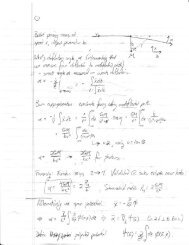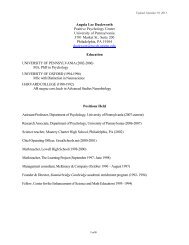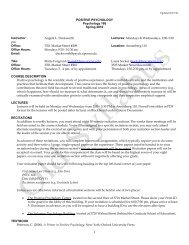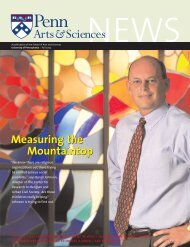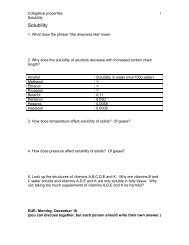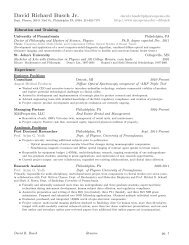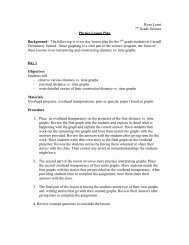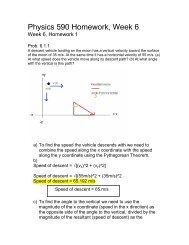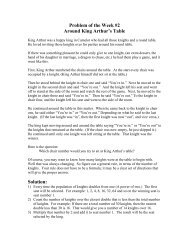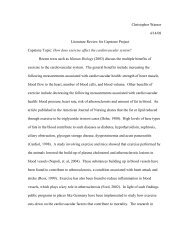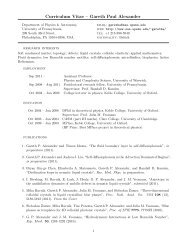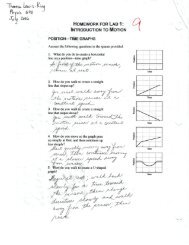PENN SUMMER - University of Pennsylvania
PENN SUMMER - University of Pennsylvania
PENN SUMMER - University of Pennsylvania
Create successful ePaper yourself
Turn your PDF publications into a flip-book with our unique Google optimized e-Paper software.
PoliTiCal SCienCe<br />
PsCI 150 920 MTWr 10:40am–12:15pm doherty-sil<br />
International Relations in Theory and Practice<br />
Fulfills Society Sector<br />
This course is an introduction to the major theories and issues in international<br />
politics. The goals <strong>of</strong> the course are to give students a broad<br />
familiarity with the field <strong>of</strong> international relations, and to help them<br />
develop the analytical skills necessary to think critically about international<br />
politics. The course is divided into four parts: 1) Concepts<br />
and Theories <strong>of</strong> International Relations; 2) War and Security; 3) The<br />
Global Economy; and 4) Emerging Issues in International Relations.<br />
PsCI 183 920 Tr 9:00am–12:00pm Wooten<br />
American Political Thought<br />
Fulfills Humanities & Social Science Sector<br />
Whether America begins with the Puritans and the Mayflower<br />
Compact, or with the Declaration <strong>of</strong> Independence and the<br />
Revolution, it is founded in resistance to empire. In the generations<br />
between, Americans have desired, dreaded and debated empire. This<br />
course will focus on empire and imperialism in American political<br />
thought. We will read primary texts addressing empire: from the departure<br />
and dissent <strong>of</strong> the Puritans, and Burke’s Speech on Conciliation<br />
with the Colonies, to 20th and 21st century debates over America’s role<br />
in the world. These texts will include political pamphlets and speeches,<br />
poetry, novels, policy papers and film.<br />
PSYCholoGY<br />
PsYC 001 920 MTWr 4:20pm–5:55pm Forgeard<br />
Introduction to Experimental Psychology<br />
Fulfills Living World Sector<br />
Introduction to the basic topics <strong>of</strong> psychology, including learning,<br />
motivation, cognition, development, abnormal, physiological, social,<br />
and personality.<br />
PsYC 149 920 Tr 5:30pm–8:40pm Coutanche<br />
Cognitive Neuroscience<br />
Fulfills Living World Sector / Prerequisite(s): PSYC 001 or BIBB 109 /<br />
Crosslisted with: BIBB 249 920<br />
The study <strong>of</strong> the neural systems that underlie human perception,<br />
memory and language; and <strong>of</strong> the pathological syndromes that result<br />
from damage to these systems.<br />
PsYC 153 920 Tr 6:00pm–9:10pm atanasov/royzman<br />
Judgment and Decisions<br />
Prerequisite(s): one semester <strong>of</strong> statistics OR microeconomics / Crosslisted with:<br />
PPE 153 920<br />
Judgment, decisions under certainty and uncertainty, problem solving,<br />
logic, rationality, and moral thinking.<br />
PsYC 162 920 Tr 5:30pm–8:40pm Zalta<br />
Abnormal Psychology<br />
Prerequisite(s): PSYC 001<br />
The concepts <strong>of</strong> normality, abnormality, and psychopathology;<br />
symptom syndromes; theory and research in psychopathology and<br />
psychotherapy.<br />
PsYC 166 920 MW 5:30pm–8:40pm Webb<br />
Introduction to Positive Psychology.<br />
Prerequisite(s): PSYC 001<br />
An introduction to the study <strong>of</strong> positive emotions, positive character<br />
traits, and positive institutions. The positive emotions consist <strong>of</strong><br />
emotions about the past (e.g., serenity, satisfaction, pride), about the<br />
future (e.g., hope, optimism, faith), and emotions about the present<br />
(pleasure and gratification). The distinction among the pleasant life,<br />
the good life, and the meaningful life is drawn. The positive traits<br />
include wisdom, courage, humanity, justice, temperance, and spirituality,<br />
and the classification <strong>of</strong> these virtues is explored. The positive<br />
institutions are exemplified by extended families, free press, humane<br />
leadership, and representative government. The course meets for one<br />
two-hour lecture and one two-hour ten-student recitation weekly.<br />
PsYC 262 920 Tr 5:30pm–8:40pm dingfelder<br />
Special Topics in Abnormal Psychology:<br />
Developmental Psychopathology<br />
Prerequisite(s): PSYC 162. Special note: for PSYC 262-301, an additional<br />
course from the Neural Basis <strong>of</strong> Behavior list is required.<br />
reliGioUS STUDieS<br />
rels 006 920 MW 6:00pm–9:10pm Fleming<br />
Religious Violence and Cults<br />
Fulfills Society Sector<br />
This course will explore issues related to religion and violence in<br />
conversation with a number <strong>of</strong> the world’s prominent religious traditions,<br />
both past and present, including Buddhism, Christianity,<br />
Hinduism, Islam, Jainism, Judaism, and Meso-American religions.<br />
We will focus on three major themes: Sacrifice (with focus on child<br />
sacrifice), Iconoclasm, and Martyrdom. In each case, we will investigate<br />
their historical roots as well as exploring their contemporary expressions<br />
and modern theories about them. Primary source readings<br />
will be selected from a broad variety <strong>of</strong> pre-modern literatures, including<br />
the Hebrew Bible, New Testament, Vedas and Puranas (Hindu<br />
Narratives), Jain Agmas, Buddhist Sutras, and Islamic ethnographic<br />
writings. Primary and secondary sources will be paired to give students<br />
a chance to reflect upon the major themes from both traditional<br />
and modern scholarly perspectives. Films will provide a source <strong>of</strong><br />
reflection for contemporary debates surrounding religious violence,<br />
and students will also have opportunities to explore theoretical issues<br />
with reference to recent and current events.<br />
<strong>SUMMER</strong> SESSIOn II • JULY 6–AUgUST 13, 2010 35



